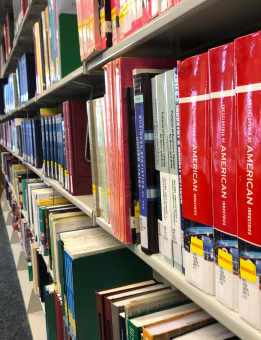By Alex Espinosa and James Bonner
Staff Writers
The library regularly goes through a process of analyzing the books in its collection, updating and replacing books as new ones are acquired.

Natalia Tomlin, an associate professor and librarian, explained the ongoing process. “The books go through a selection process detailing which will be exchanged, discarded or renewed. Some of the ways we do this is if a book is in poor physical condition, we may exchange it for an electronic version of that book or buy a copy that is in better condition.” This weeding process is used by all public and special libraries, Tomlin said. The only type of library that doesn’t weed books is an archive library.
Through the process of collection development, the library acquires books as well as online sources. In that process, books and other sources may be discarded because they “no longer serve the purpose of our collection,” Tomlin said.
Certain books are maintained because they are needed for classes. The librarians involved in the collection development process take a class in library sciences to acquire the skills, tools, and online sources needed to determine which books stay and which books leave the collection.
What happens to the books that may be discarded? “In the rare case the books are so damaged to the point where they can’t be sold, read or repaired, they are recycled with along with the bottles, cans, and other recyclable material produced at the school,” Tomlin said. Other books are donated to Better World Books.
Students who learned of the discarding of books were upset by the process. One student said she recovered some books from the trash and took them home for her own personal library.
“People love books, so if I see a book thrown on the ground, I get upset because I have a lot of respect for books,” Tomlin said. “You know books are knowledge, books are friends, so it’s natural to get upset. And we see books as something good, so when students see the books being mistreated in some way, such as for example, see them tossed in piles, we get the wrong idea,” Tomlin said.




Be First to Comment